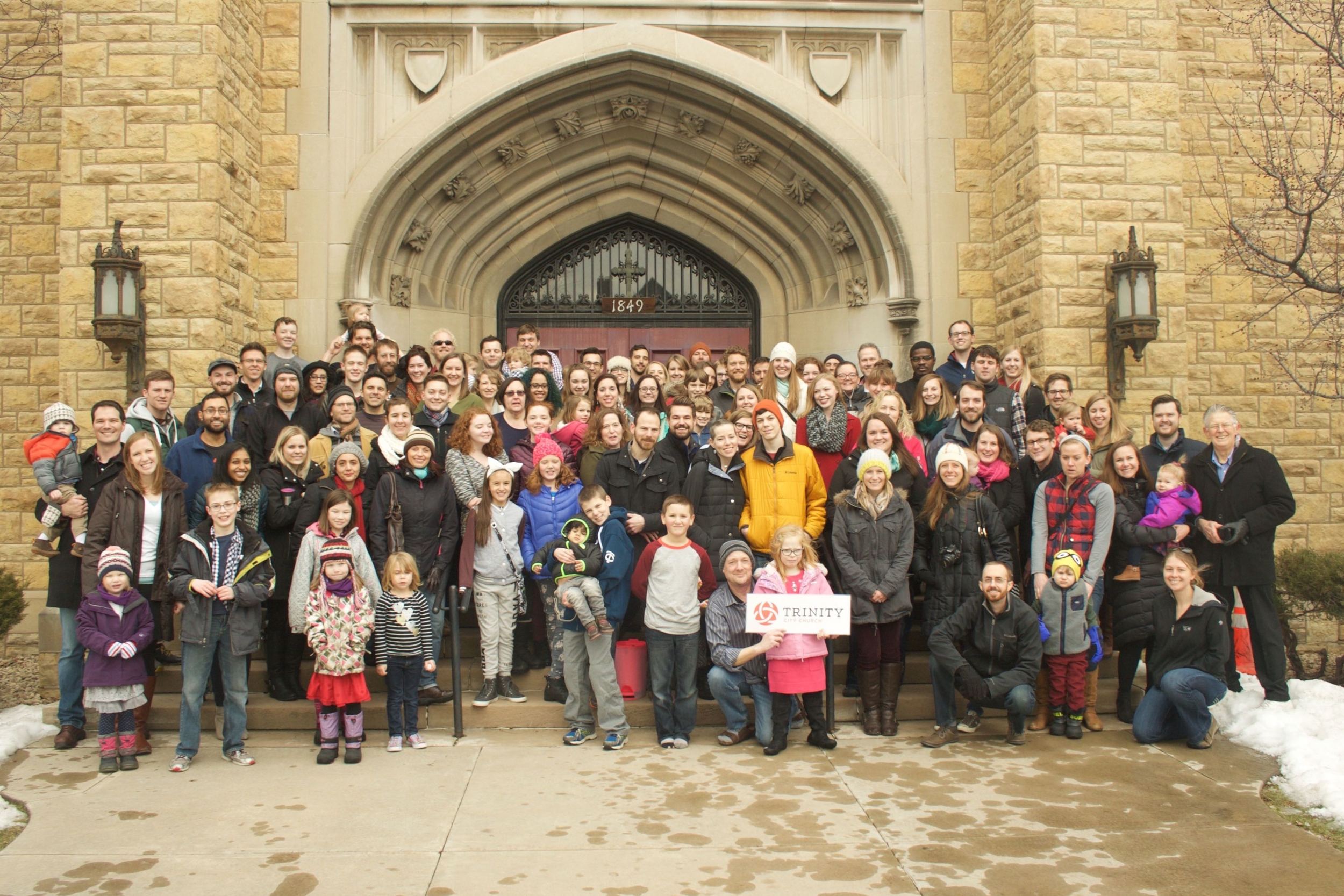Holy Week is here. At Trinity City Church, we started the season of Lent with an Ash Wednesday service, and last Sunday we celebrated Palm Sunday. This week we'll be gathering for Maunday Thursday meals, a Good Friday service, and finally celebrating Easter with baptisms.
What is the meaning and significance of this time in the church calendar? Let's consider some of the explanations from The Worship Sourcebook (the rest of the post quotes The Worship Sourcebook under each heading).
The Season of Lent
The death and resurrection of Jesus Christ are at the heart of the Christian gospel, and Good Friday and Easter are two of the most significant celebrations of the Christian year. Lent is a season of preparation and repentance during which we anticipate Good Friday and Easter. Just as we carefully prepare for big events in our personal lives, such as a wedding or commencement, Lent invites us to make our hearts ready for remembering Jesus’ passion and celebrating Jesus’ resurrection.
The practice of a forty-day preparation period began in the Christian church during the third and fourth centuries. The number forty carries biblical significance based on the forty years Israel spent in the wilderness and Jesus’ forty-day fast in the wilderness. The forty days of Lent begin on Ash Wednesday and continue through holy week, not counting Sundays (which are reserved for celebratory worship). In practice, many congregations choose to focus Sunday worship on the themes of repentance and renewal. As a period of preparation, Lent has historically included the instruction of persons for baptism and profession of faith on Easter Sunday; the calling back of those who have become estranged from the church; and efforts by all Christians to deepen their piety, devotion, and readiness to mark the death and resurrection of their Savior. As such, the primary focus of the season is to explore and deepen a “baptismal spirituality” that centers on our union with Christ rather than to function only as an extended meditation on Christ’s suffering and death.
Ash Wednesday
Ash Wednesday is the first day of Lent. By the fourth century the Western church had determined that the Lenten period of fasting and renewal should correspond to Christ’s forty-day fast (Matt. 4:2), and, by counting forty days back from Easter (excluding Sundays, which remain “feast” days), arrived at the Wednesday seven weeks before Easter. At one time Lent was primarily viewed as a period during which converts prepared for baptism on Easter Sunday, but later the season became a general time of penitence and renewal for all Christians. Thus Ash Wednesday became the day that marked the beginning of the Lenten renewal.
The aim of Ash Wednesday worship is threefold: to meditate on our mortality, sinfulness, and need of a savior; to renew our commitment to daily repentance in the Lenten season and in all of life; and to remember with confidence and gratitude that Christ has conquered death and sin. Ash Wednesday worship, then, is filled with gospel truth. It is a witness to the power and beauty of our union with Christ and to the daily dying and rising with Christ that this entails.
The imposition of ashes is often central part of the worship service. Ashes have a long history in biblical and church traditions. In Scripture ashes or dust symbolize frailty or death (Gen. 18:27), sadness or mourning (Esther 4:3), judgment (Lam. 3:16), and repentance (Jon. 3:6). Some traditions also have considered ash a purifying or cleansing agent. All these images are caught up in the church’s use of ashes as a symbol appropriate for Lent. In Christ’s passion we see God’s judgment on evil; in our penitence we express sorrow and repentance for our sins; in our rededication we show that we are purified and renewed. The ashes, which often are the burnt residue of the previous year’s palms from Palm Sunday, are often mixed with a little water and carried in a small dish. As the leader goes from worshiper to worshiper, or as worshipers come forward, the leader dips a finger in the moist ash and makes a cross on each person’s forehead (the “imposition”), saying words such as “Remember that you are dust and to dust you shall return,” or, “Consider yourself dead to sin and alive in Jesus Christ.”
In some contexts, the imposition of ashes may be a barrier to thoughtful Lenten worship because of its newness or because it may be misunderstood. Most important is that worshipers rend their hearts (Joel 2:13). Decisions about whether or how to practice the imposition of ashes should always take into account that the service should build up the body of Christ.
Palm Sunday
The events framed by Jesus’ entry into Jerusalem and his resurrection are some of the most dramatic and theologically important of the entire scriptural narrative. These days feature not only the drama of the triumphal entry, trial, last supper, and crucifixion but also poignant prayers and prophetic teachings of our Lord. John’s gospel devotes eight of its twenty-one chapters to this week alone! The week begins with Passion/Palm Sunday and ends with the “three days” (also called the Triduum, from sunset on Thursday to sunset on Easter Day), the period during which we mark Jesus’ trial, death, and resurrection.
The first Sunday of Holy Week is commonly called either “Palm Sunday” or “Passion Sunday.” Those who call it “Palm Sunday” tend to focus on the entry of Christ into Jerusalem to shouts of “Hosanna! Blessed is the one who comes in the name of the Lord!” (Mark 11:9). Those who refer to the day as “Passion Sunday” tend to focus on Jesus’ suffering. This is especially appropriate in contexts in which participation in midweek services on Maundy Thursday or Good Friday is difficult or minimal, and, as a result, worshipers would sing “Hosanna” on one Sunday and “Christ arose” on the next, with little attention to Jesus’ suffering and death in between.
But even for congregations that celebrate the day as Palm Sunday, it’s important to capture the irony of the day. This is the day on which Jesus entered the city in triumph, but as a part of his journey to the cross; this is the week in which crowd’s cries of “Hosanna” would soon turn to “Crucify him!” One helpful approach to Palm Sunday worship is to begin by focusing on the procession into Jerusalem and then to concentrate on the suffering and passion of Jesus.
Maundy Thursday
On Maundy Thursday the church remembers the last evening Jesus shared with his disciples in the upper room before his arrest and crucifixion. Maundy Thursday marks three key events in Jesus’ last week: his washing of his disciples’ feet, his institution of the Lord’s Supper, and his new commandment to love one another.
The name “Maundy Thursday” comes from the Latin mandatum novum, referring to the “new commandment” Jesus taught his disciples (John 13:34). In other words, this is “new commandment Thursday.” Maundy Thursday worship naturally features the Lord’s Supper and, in some traditions, an act of foot washing or another sign of mutual love and dedication.
Celebrations of the Lord’s Supper can call attention to the many theologically rich dimensions of the Last Supper itself, including its attention to communal love and its clear eschatological orientation (its focus on hopeful anticipation of the coming kingdom).
Good Friday and Easter
Good Friday marks the death of Jesus Christ. It’s called “good” because of what Jesus’ death means for the redemption of the world. Worship on this day may focus on three aims: (1) to narrate and remember the events of Jesus’ death, (2) to open up the meaning of these events for our understanding of God and the redemption accomplished by the cross, and (3) to invite worshipers to renewed prayer and dedication.
All the hopes and expectations of Christians are realized in the resurrection of Jesus Christ from the dead, making Easter the most celebrative day of the church year.


































